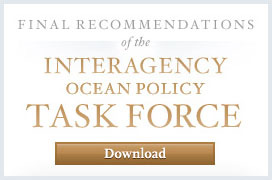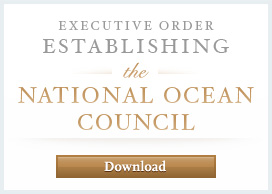Marine Planning
Marine planning is a science-based tool that regions can use to address specific ocean management challenges and advance their economic development and conservation objectives. Marine planning will support regional actions and decision-making and address regionally determined priorities, based on the needs, interests, and capacity of a given region. Just as Federal agencies work with States, tribes, local governments, and users of forests and grasslands, among other areas, marine planning will provide a more coordinated and responsive Federal presence and the opportunity for all coastal and ocean interests in a region to share information and coordinate activities. This will promote more efficient and effective decision-making and enhance regional economic, environmental, social, and cultural well being. In turn, regional actions will support national objectives to grow the ocean economy, increase regulatory efficiency and consistency, and reduce adverse impacts to environmentally sensitive areas.
The scope, scale, and content of marine planning will be defined by the regions themselves, to solve problems that regions care about in ways that reflect their unique interests, capacity to participate, and ways of doing business. Marine planning should build on and complement existing programs, partnerships, and initiatives. The intent is to ensure that a region can develop an approach that it determines works best. This approach balances regional and national interests and recognizes that actions commensurate with regional interests and capacities will provide the most immediate regional benefits. Knowledge and experience will build over time and contribute to achieving national objectives.
States, tribes, and Regional Fishery Management Councils may choose to participate on regional planning bodies established in accordance with the National Ocean Policy Executive Order, the Implementation Plan, and guidance to be released by the National Ocean Council. State, tribal, and Fishery Management Council participation on regional planning bodies is voluntary. Should all States within a region choose not to participate in a regional planning body within their region, a regional planning body will not be established. Instead, Federal agencies will identify and address priority science, information, and ocean management issues associated with marine planning as described in the Executive Order. In doing so, Federal agencies will coordinate with non-Federal partners and authorities, including States, federally-recognized tribes and Fishery Management Councils, and stakeholders, to ensure that Federal actions support and advance both regional and national objectives.
Marine plans produced by regional planning bodies can provide information about specific issues, resources, or areas of interest to better inform existing management measures. Or, they can describe future desired conditions and provide information and guidance that supports regional action moving forward. Each region has flexibility to build the elements of its plans over time in response to what the region wants to accomplish, the resources available to do the work, and the time it will take to learn what works best in that region. Examples of potential focus areas for marine planning could include, but are not limited to:
- Developing information that facilitates more effective review and permitting among State, Federal, and tribal authorities for a specific class of activity such as offshore energy infrastructure;
- Characterizing environmental conditions and current and anticipated future uses of marine space to assist in siting offshore renewable energy;
- Developing and implementing a plan to acquire data and information to support more efficient management of activities of particular regional interest, such as remote sensing data to support coastal mapping;
- Identifying a specific geographic area and addressing management challenges that would benefit from multi-government resolution;
- Identifying and developing information that better informs agency or government-to-government consultations under the Endangered Species Act, Marine Mammal Protection Act, and the National Environmental Policy Act that apply to offshore development activities important to the region; or
- Developing maps and information that inform effective co-location of multiple existing and new ocean uses, such as commercial fishing, military training, and new energy infrastructure development.
Robust stakeholder engagement and public participation are essential to ensure that actions are based on a full understanding of the range of interests and interactions that occur in each region. Consultation with scientists, technical experts, the business community, and those with traditional knowledge is a foundation of marine planning.
Regional planning bodies are not regulatory bodies and have no independent legal authority to regulate or otherwise direct Federal, State, tribal, or local government actions. All activities will continue to be regulated under existing authorities. For example, commercial and recreational fishing will continue to be managed exclusively by the relevant State and Federal fisheries managers and Regional Fishery Management Councils or Commissions.
The National Ocean Council has released a Marine Planning Handbook to support the efforts of regions that choose to engage marine industries, stakeholders, the public, and government to advance their economic development and conservation priorities.
Click here to read the Guidance for Marine Plans.
Click here to read the Marine Planning Handbook.
Click here to read The Legal Authority for Coastal and Marine Planning.



